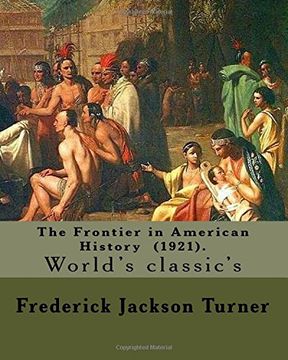The Frontier in American History (1921). By: Frederick Jackson Turner: Frederick Jackson Turner (November 14, 1861 – March 14, 1932) was an American ... of Wisconsin until 1910, and then at Harvard. (en Inglés)
Reseña del libro "The Frontier in American History (1921). By: Frederick Jackson Turner: Frederick Jackson Turner (November 14, 1861 – March 14, 1932) was an American ... of Wisconsin until 1910, and then at Harvard. (en Inglés)"
Frederick Jackson Turner (November 14, 1861 - March 14, 1932) was an American historian in the early 20th century, based at the University of Wisconsin until 1910, and then at Harvard. He trained many PhDs who came to occupy prominent places in the history profession. He promoted interdisciplinary and quantitative methods, often with a focus on the Midwest. He is best known for his essay "The Significance of the Frontier in American History", whose ideas formed the Frontier Thesis. He argued that the moving western frontier shaped American democracy and the American character from the colonial era until 1890. He is also known for his theories of geographical sectionalism. In recent years historians and academics have argued strenuously over Turner's work; all agree that the Frontier Thesis has had an enormous impact on historical scholarship and the American mind. Early life, education, and career: Born in Portage, Wisconsin, the son of Andrew Jackson Turner and Mary Olivia Hanford Turner, Turner grew up in a middle-class family. His father was active in Republican politics, an investor in the railroad, and was a newspaper editor and publisher. His mother taught school.Turner was very much influenced by the writing of Ralph Waldo Emerson, a poet known for his focus on nature; so too was Turner influenced by scientists such as Charles Darwin, Herbert Spencer, and Julian Huxley, and the development of Cartography.He graduated from the University of Wisconsin (now University of Wisconsin-Madison) in 1884, where he was a member of Phi Kappa Psi Fraternity. He earned his Ph.D. in history from Johns Hopkins University in 1890 with a thesis on the Wisconsin fur trade, titled "The Character and Influence of the Indian Trade in Wisconsin", directed by Herbert Baxter Adams. Turner did not publish extensively; his influence came from tersely expressed interpretive theories (published in articles), which influenced his hundreds of disciples. Two theories in particular were influential, the "Frontier Thesis" and the "Sectional Hypothesis". Although he published little, he did more research than almost anyone and had an encyclopedic knowledge of American history, earning a reputation by 1910 as one of the two or three most influential historians in the country. He proved adept at promoting his ideas and his students, whom he systematically placed in leading universities, including Merle Curti and Marcus Lee Hansen. He circulated copies of his essays and lectures to important scholars and literary figures, published extensively in highbrow magazines, recycled favorite material, attaining the largest possible audience for key concepts, and wielded considerable influence within the American Historical Association as an officer and advisor for the American Historical Review. His emphasis on the importance of the frontier in shaping American character influenced the interpretation found in thousands of scholarly histories. By the time Turner died in 1932, 60% of the leading history departments in the U.S. were teaching courses in frontier history along Turnerian lines. Annoyed by the university regents who demanded less research and more teaching and state service, Turner sought out an environment that would support research. Declining offers from California, he accepted a call to Harvard in 1910 and remained a professor there until 1922, being succeeded in 1924 by Arthur M. Schlesinger, Sr. In 1907 Turner was elected a member of the American Antiquarian Society, and in 1911 he was elected a fellow of the American Academy of Arts and Sciences. Turner was never comfortable at Harvard; when he retired in 1922 he became a visiting scholar at the Huntington Library in Los Angeles, where his note cards and files continued to pile up, although few monographs got published. His The Frontier in American History (1920) was a collection of older essays....

